BOARDWATCH: Chicago Board of Education meeting of August 26, 2015 highlighted by large public protests against budget lies before the Board doubles down and votes to approve its $5.7 billion budget for the 2015 - 2016 school year...
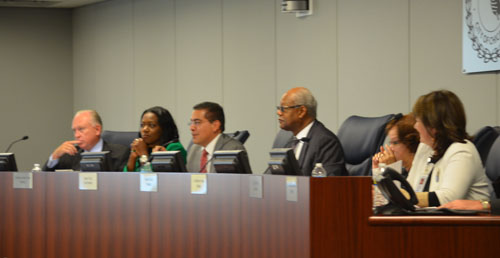 By the time of the August 26, 2015 meeting of the Chicago Board of Education began, Mayor Rahm Emanuel had replaced most of the Board members. Above, six of the seven members of the "new board." Left to right: Mark Furlong, Dominique Jordan-Turner, Jesse Ruiz (who had been on the Board); Frank Clark (new Board President); Mahalia Hines (who had been on the Board); and Gail Ward. Not in the photograph is Rev. Garanzini, who was seated beside Gail Ward. Substance photo by George N. Schmidt.Prior to the Chicago Board of Education regular monthly meeting on Wednesday, August 26, 2015, at the Chicago Public Schools Loop Offices at 42 West Madison St., were demonstrations by the Dyett High School hunger strikers. Another group was protesting Special Education (SPED) cuts. There was also a march on the local Bank of American offices.
By the time of the August 26, 2015 meeting of the Chicago Board of Education began, Mayor Rahm Emanuel had replaced most of the Board members. Above, six of the seven members of the "new board." Left to right: Mark Furlong, Dominique Jordan-Turner, Jesse Ruiz (who had been on the Board); Frank Clark (new Board President); Mahalia Hines (who had been on the Board); and Gail Ward. Not in the photograph is Rev. Garanzini, who was seated beside Gail Ward. Substance photo by George N. Schmidt.Prior to the Chicago Board of Education regular monthly meeting on Wednesday, August 26, 2015, at the Chicago Public Schools Loop Offices at 42 West Madison St., were demonstrations by the Dyett High School hunger strikers. Another group was protesting Special Education (SPED) cuts. There was also a march on the local Bank of American offices.
Roll call indicated all Board members were present: Mark F. Furlong, Dominique Jordan-Turner, Vice-President Jesse Ruiz, President Frank Clark, Dr. Mahalia A. Hines, Gail D. Ward, and Rev. Michael G. Garanzini, S. J. Also present were Chief Executive Officer (CEO) Forrest Claypool, Chief Education Officer Janice Jackson, and Chief Counsel James Bebley.
The meeting began with student performers, some as young as Kindergarten, from Edwards Elementary School playing selections on violins. Next, a jazz ensemble from Jones Prep High School performed instrumental music.
The business portion of the meeting followed with Power Point presentations and discussions.
Chief Executive Officer (CEO) Forrest Claypool said that the state of Illinois needs to "step up" for pensions, that Chicago is the only district in the state that must fund its own pensions. He added that the Chicago Teachers Union (CTU) and the City of Chicago need to be partners in this pursuit.
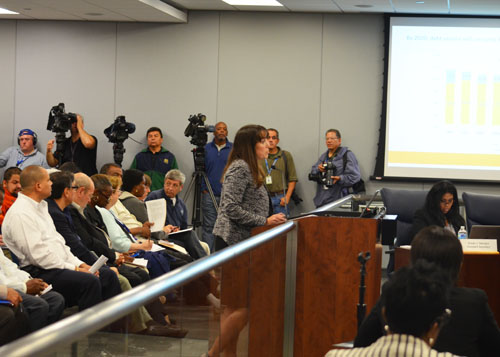 Ginger Ostro, the latest "Chief Financial Officer" of the nation's third largest school system, presented the Board with a Power Point version of the 2015 - 2016 budget. The Power Point, which showed a version of Illinois revenues, left out all facts about local revenues (which are based on Chicago property taxes). Ostro's presentation was praised by the members of the Board, five of whom were new. No seriously critical questions were asked, despite the fact that one state legislator told the Board is has little or no credibility in Springfield, the Illinois State Capitol. Substance photo by George N. Schmidt.Claypool then introduced Ginger Ostro, Chief Financial Officer (CFO). Ostro provided a Power Point presentation on the FY16 (Fiscal Year 16) Budget, which was identical to the one the Board had prepared and presented to the August 18 hearings on the budget. For the fourth year in a row, the Board refused to provide printed copies of the budget (or even of the Power Point for most people), breaking a policy more than 150 years old of making copies of the Proposed budget available at public libraries, public schools, and the offices of the city's 50 aldermen.
Ginger Ostro, the latest "Chief Financial Officer" of the nation's third largest school system, presented the Board with a Power Point version of the 2015 - 2016 budget. The Power Point, which showed a version of Illinois revenues, left out all facts about local revenues (which are based on Chicago property taxes). Ostro's presentation was praised by the members of the Board, five of whom were new. No seriously critical questions were asked, despite the fact that one state legislator told the Board is has little or no credibility in Springfield, the Illinois State Capitol. Substance photo by George N. Schmidt.Claypool then introduced Ginger Ostro, Chief Financial Officer (CFO). Ostro provided a Power Point presentation on the FY16 (Fiscal Year 16) Budget, which was identical to the one the Board had prepared and presented to the August 18 hearings on the budget. For the fourth year in a row, the Board refused to provide printed copies of the budget (or even of the Power Point for most people), breaking a policy more than 150 years old of making copies of the Proposed budget available at public libraries, public schools, and the offices of the city's 50 aldermen.
The Power Point was called "Overview." Later a vote on the budget would be taken by the Board members. Ostro said that many cuts have been made, repeating the claim that the Board is trying to keep cuts "away from the classroom." Setting a start date for most things with the year Rahm Emanuel became mayor and appointed his first Board of Education members and CEO (David Vitale as Board president and Jean-Claude Brizard as the first CEO), she said that cuts of $740 million to $1.1 billion have been made since FY11 and that $200 million more would be made this year.
She also said that the state has contributed $3.7 billion this year to fund teachers' pensions outside Chicago, but only $12 million to fund Chicago teachers. She claimed that all officials agree funding is inequitable in the state.
The official version of the "Operating Budget" details were listed on a screen visible to all. For FY16, Ostro said, the budget reflects $64.3 million below FY15. She said the Proposed Budget has been slightly changed due to community feedback at the August 18 budget hearings. Other items mentioned were revised bell times (bell times were changed at 42 schools, supposedly to save money on busing), restored funds for what CPS called "diverse learner services" (in the rest of the USA, this is called "special education"), and perhaps some other adjustments. The Board members complimented her and themselves based on the claim that they "listen" to the public.
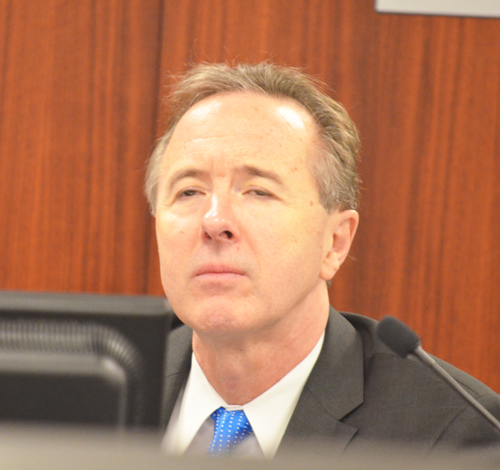 Anyone who believed that the smug arrogance of the previous Board members and Chief Executive Officer would be subdued, if only for public consumption during the supposed financial crisis, had to decide that if anything the arrogance was to get worse under Forrest Claypool (CEO) and Frank Clark (Board President). While Clark smiled relentlessly during public participation even when individuals were highly critical of the Board's mendacious policies, Claypool could barely conceal his disdain for anyone who didn't see and understand the wisdom of the nonsense had had just put forward as his first "budget." At many points, Claypool either stared vacantly to the front or looked as if he were bored to the point of sleepiness. Above, Claypool caught during the Board meeting. Substance photo by George N. Schmidt.Ostro also said that a phase out of the pension pick-up has begun immediately for "non-union employees". The amount she told the Board would be "saved" by reducing the wages of the remaining non-union CPS workers was several times the amount any reasonable calculation based on the facts, but none of the Board members challenged her numbers.
Anyone who believed that the smug arrogance of the previous Board members and Chief Executive Officer would be subdued, if only for public consumption during the supposed financial crisis, had to decide that if anything the arrogance was to get worse under Forrest Claypool (CEO) and Frank Clark (Board President). While Clark smiled relentlessly during public participation even when individuals were highly critical of the Board's mendacious policies, Claypool could barely conceal his disdain for anyone who didn't see and understand the wisdom of the nonsense had had just put forward as his first "budget." At many points, Claypool either stared vacantly to the front or looked as if he were bored to the point of sleepiness. Above, Claypool caught during the Board meeting. Substance photo by George N. Schmidt.Ostro also said that a phase out of the pension pick-up has begun immediately for "non-union employees". The amount she told the Board would be "saved" by reducing the wages of the remaining non-union CPS workers was several times the amount any reasonable calculation based on the facts, but none of the Board members challenged her numbers.
Ostro told the Board members and public that the $1.1 billion "deficit" had been closed by various means. She went into details according to the CPS version. She said that revenue problems of $900 million would be met from a short-term "line of credit." Almost ignoring the fact that the Board had nearly doubled its high-interest debts during the years since Rahm Emanuel became mayor (May 2011), she continued to claim that the main problems facing the nation's third largest school system were teacher pensions and the fact that Illinois wasn't paying what CPS claims is its "fair share." Repeating the talking point that CPS has been repeating since February, she said was that a half billion dollars must come from Illinois if the budget presented (and later approved) on August 26 is to actually be "balanced" as the school year progresses.
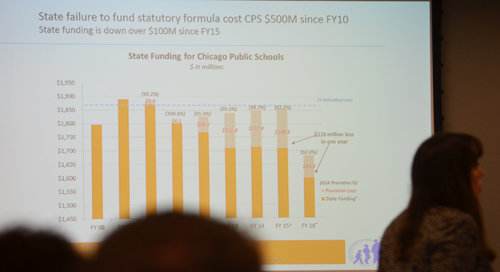 Despite the fact that an Illinois State Representative was sitting in front of them, the Board of Education members nodded when Ginger Ostro's Power Point presentation showed a dramatic decline in "state funding." There was no comparable slide showing the chronological trends in local property tax revenues, despite the fact that these constitute the largest amount of money coming into Chicago's public schools in any year. Once again, the Board ignored the fact that it has the power to raise local property taxes above the so-called "cap," but refuses to do so. To the right in the shadow in the above photograph is CPS CFO Ginger Ostro. Substance photo by George N. Schmidt.Salaries and benefits were covered next. She said $480 million in support and equity from the state is needed and that the state's failure to fund a statutory formula had cost Chicago Public Schools (CPS) $500 million since FY15. She added that state funding was down over $100 million since FY15. She also said that the state resources are declining and that CPS will spend $1700 per student on pension contributions this year, while the state will fund locations outside Chicago with $2266 for every $31 funded to CPS.
Despite the fact that an Illinois State Representative was sitting in front of them, the Board of Education members nodded when Ginger Ostro's Power Point presentation showed a dramatic decline in "state funding." There was no comparable slide showing the chronological trends in local property tax revenues, despite the fact that these constitute the largest amount of money coming into Chicago's public schools in any year. Once again, the Board ignored the fact that it has the power to raise local property taxes above the so-called "cap," but refuses to do so. To the right in the shadow in the above photograph is CPS CFO Ginger Ostro. Substance photo by George N. Schmidt.Salaries and benefits were covered next. She said $480 million in support and equity from the state is needed and that the state's failure to fund a statutory formula had cost Chicago Public Schools (CPS) $500 million since FY15. She added that state funding was down over $100 million since FY15. She also said that the state resources are declining and that CPS will spend $1700 per student on pension contributions this year, while the state will fund locations outside Chicago with $2266 for every $31 funded to CPS.
Next CPS actions to close the $1.1 billions budget gap were listed. She said that there are $79 million in "reserves" and was asked no questions about how many "reserve" funds are buried inside the various categories in the budget. "Cash Flow Issues" came next. She said that access to our lines of credit will allow CPS to pay bills on a day-to-day basis, but noted that two challenges to "cash flow" arise during the school year. A Power Point slide was utilized to demonstrate that claim. But even though the largest percentage of revenue to CPS comes from local property taxes, there was no slide showing the year-to-year situation with local property taxes. This point had been noted during the budget hearings, but was not corrected for the Board meeting.
The Capital Budget Overview reported that most of the school system's 700 buildings are overage, some as old as 70 years, making it a challenge to maintain buildings.
She indicated that more information would be available at www.cps.edu/capitalplan.
The next topic regarding the budget was Debt Service. Ostro stated that by 2020, debt service will consume "62% of unrestricted General State Aid (GSA)." She also said that there is $261 support from state aid based on the number of low-income students and borrowing is not a long-term solution to the budget.
After mentioning that three budget hearings were held regarding the budget process and listing what she said were concerns that voiced at the hearings, she informed all that "a full transcripts of the hearings" was supposed to be available on the CPS website. [As of August 28, when this story was edited in its final form, the transcripts were still not available on the Board's website].
Ostro concluded, "This is not the budget that we want, but it protects the classroom." She added that in her opinion the Illinois Governor, Speaker of the House, and the Senate President all agree funding is inequitable and must be changed.
Following her Power Point on the Proposed Budget, Ostro delivered a brief second Power Point on the borrowing that was on the agenda for the day's meeting. She explained said that issuing bonds is "a multi-step process governed by state statutes" and outlined it on the screen. She also mentioned that the Board was "refinancing existing debt" to free General State Aid, converting all debt to fixed rates.
She said that CPS is paying "swap terminations" fees to the banks that had issued the variable rate bonds without explaining any of the history of the scandal behind those deal or addressing the protests that have been ongoing for more than six years since the deals were first exposed at Board budget hearings in 2009. Observers expressed anger that after being asked to demand arbitration on the "toxic swaps," the Board has refused to challenge what the banks did and has simply been paying the additional fees, at great cost to the school system.
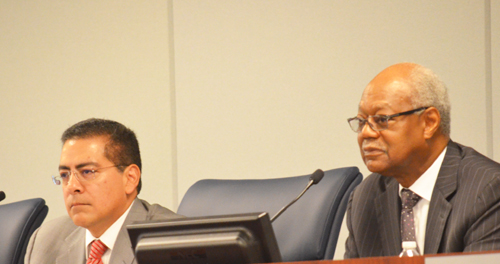 Chicago Board of Education Vice President Jesse Ruiz and President Frank Clark during the August 26, 2015 meeting of the Chicago Board of Education. Substance photo by George N. Schmidt. President Frank Clark thanked her. He said that the budget is "not sustainable long term," and added that everyone needs to help. "We're doing aggressive cuts," he said.
Chicago Board of Education Vice President Jesse Ruiz and President Frank Clark during the August 26, 2015 meeting of the Chicago Board of Education. Substance photo by George N. Schmidt. President Frank Clark thanked her. He said that the budget is "not sustainable long term," and added that everyone needs to help. "We're doing aggressive cuts," he said.
In response to a question from Board Member Mark Furlong about the low points in the projected cash flow, Ostro replied that in February, a deposit needs to be made for the June pension payment.
Board member Garanzini said the public is concerned about how decisions are made, citing bell times, and diverse learners. He asked, "What have we learned about the
decision-making process?" There was no discussion of how much, for example, the busing changes would save versus other things the Board was spending money on.
The meeting then seemed to move towards public participation, but it was interrupted when the Board members noted that they had one more Power Point to go -- single and sole sourcing. President Clark informed all that the individual members of the public can meet with Board members and schedule an appointment by calling 773-553-1600.
According to the Board's Secretary Estela Beltran, the next Board meeting is scheduled for Tuesday, September 29, with registration to speak or observe scheduled from 8 a.m.
Tuesday, September 22, to 5 p.m. Friday, September 25. "Registration ends when all slots have been filled," she added. The additional Power Point report was then presented prior to public participation by Ms. Rollins, regarding a review of the CPS "Sole Sourcing" process. Following the public scandal caused by the Board's June 2013 approval of a no-bid contract of $20.5 million to SUPES Academy, Board Vice President Jesse Ruiz had become "Interim CEO" after the resignation of Barbara Byrd Bennett. Ruiz had ordered a review of the Board's "Sole Sourcing" and "Single Sourcing" policies. A Power Point review the story and indicated that "sound practices" were being put into place and six recommendations which would be available on the CPS Procurement website by the end of the day. The sound practices referred to a sole source (only one vendor - we had only this in the past), a single source, the modification of NPRC voting procedures to a secret ballot, and creation of an NPRC charter. Company ownership information would be expanded to include CPS's relations with suppliers. Biddable and non-biddable definitions would be clarified.
Board President commented, "Our practices are in good order for the most part."
Public participation began with public officials, Susan Sadlowski Garza, new 10th Ward alderman, Ann Williams, Illinois State Representative from the 11th District, and Kristine Mayle, CTU Financial Secretary.
Alderman Garza mentioned her background: she was a lunch lady, got her master's degree, and then became a counsellor. She remarked that she made her pension payment every month unlike CPS which chose to skip its payment. She then spoke of respect and said that thousands of families across the city don't experience respect. 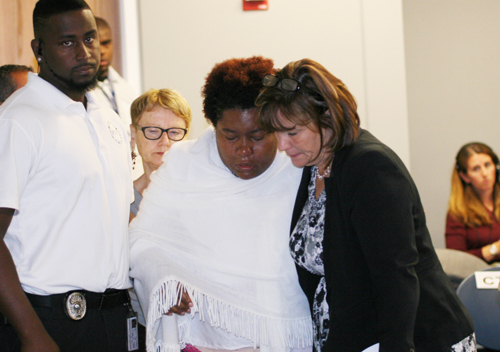 Tenth Ward Alderman Sue Sadlowski Garza (right) helps Dyett hunger striker Jeanette Taylor to a chair after Taylor became weak while speaking to the Board at the August 26 meeting. Taylor was later taken to Northwestern Memorial Hospital, where she was treated and released. Substance photo by David Vance.She introduced Jeanette Taylor who has participated in the hunger strike for Dyett High School for ten days. Ms. Taylor is 40 and on the Local School Council (LSC) since she was 19. Ms. Taylor said that the lack of a decision regarding Dyett showed no respect to black and brown parents. At the end of her testimony, she was interrupted repeatedly.
Tenth Ward Alderman Sue Sadlowski Garza (right) helps Dyett hunger striker Jeanette Taylor to a chair after Taylor became weak while speaking to the Board at the August 26 meeting. Taylor was later taken to Northwestern Memorial Hospital, where she was treated and released. Substance photo by David Vance.She introduced Jeanette Taylor who has participated in the hunger strike for Dyett High School for ten days. Ms. Taylor is 40 and on the Local School Council (LSC) since she was 19. Ms. Taylor said that the lack of a decision regarding Dyett showed no respect to black and brown parents. At the end of her testimony, she was interrupted repeatedly.
Next Ann Williams, State Rep from the 11th District, said she was here about the cuts. She remarked that this was an unprecedented crisis in CPS. She said the local schools were among the best and were now experiencing a $400 thousand to $2.1 million dollar loss. She spoke about the fact that nothing has changed since July 2013 and the situation was more dire now. She was inspired by the commitment of parents and said the principal and assistant-principal said, "We'll get there earlier and work harder," when
asked how they would deal with this financial crisis. She added that one parent who had never considered moving from the city was now considering moving to the suburbs.
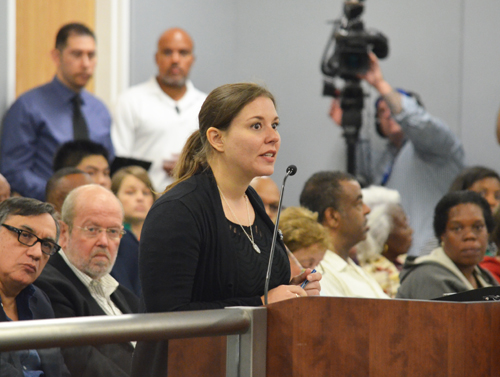 Chicago Teachers Union Financial Secretary Kristine Mayle spoke on behalf of the union, criticizing the Board especially for the cuts in special education. For the third month in a row, Mayle faced CPS security after Board Secretary Estela Beltran called "time" prematurely and Mayle was ordered to shut up, then removed from the podium. As usual, fewer than 30 people actually spoke during the "public participation" part of the meeting, yet CPS officials continue the practice of gagging speakers they don't like at two minutes and limiting the number of speakers to a total of 60 based on the absurd math used by the Chicago Board of Education in many instances, not just its budgets. Substance photo by George N. Schmidt. After she spoke, Kristine Mayle, CTU Financial Secretary, said she was here today to sound the alarm regarding the cuts to Special Education (SPED). She said that CPS was hiding a "study" from the public. When the Board announced massive cuts in special education at schools across Chicago (a total of 625 positions, according to Access Living's analysis), Markay Winston (who is currently chief officer for OODLSS -- what the Board currently calls its special education department) claimed that the cuts had been based on a "study" supposedly done by or for CPS. But as of the date of the Board meeting, nobody outside CPS had seen the study, despite requests under the Freedom of Information Act (FOIA) from disability rights advocates.
Chicago Teachers Union Financial Secretary Kristine Mayle spoke on behalf of the union, criticizing the Board especially for the cuts in special education. For the third month in a row, Mayle faced CPS security after Board Secretary Estela Beltran called "time" prematurely and Mayle was ordered to shut up, then removed from the podium. As usual, fewer than 30 people actually spoke during the "public participation" part of the meeting, yet CPS officials continue the practice of gagging speakers they don't like at two minutes and limiting the number of speakers to a total of 60 based on the absurd math used by the Chicago Board of Education in many instances, not just its budgets. Substance photo by George N. Schmidt. After she spoke, Kristine Mayle, CTU Financial Secretary, said she was here today to sound the alarm regarding the cuts to Special Education (SPED). She said that CPS was hiding a "study" from the public. When the Board announced massive cuts in special education at schools across Chicago (a total of 625 positions, according to Access Living's analysis), Markay Winston (who is currently chief officer for OODLSS -- what the Board currently calls its special education department) claimed that the cuts had been based on a "study" supposedly done by or for CPS. But as of the date of the Board meeting, nobody outside CPS had seen the study, despite requests under the Freedom of Information Act (FOIA) from disability rights advocates.
Challenging the Board's budget analysis, Mayle said the banks should be starved instead of the parents, teachers, students and schools. She asked the Board, "Do not delay on the question of Dyett." She added that people's lives are the in balance, that one hunger striker was in the hospital on life support. She asked the Board to approve the plan for Dyett today. She said, "Stop scoundrels like the Board of Education." She also said that Vaughn High School was facing 40% cuts. She was interrupted and removed by security
guards.
Board President remarked that we need to allow time for all and "we do listen." He then said, "Now for the rest of public participation."
Board Secretary Estela Beltran then gave the directions for staying within the two-minute time limits.
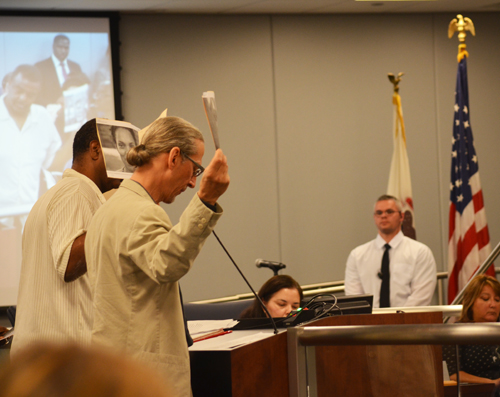 University of Illinois (at Chicago) Professor Rico Gutstein presented the Board with the plea from the Dyett hunger strikers on behalf of the Global high school planned for the Dyett building. Substance photo by George N. Schmidt.The first public participant to speak was Rico Gutstein, a professor at the University of Illinois Chicago (UIC) who said an ambulance had just been called for a Dyett hunger striker (Jeanette Taylor who spoke earlier). He said 75% of commuity respondents favor our plan for Dyett. He informed the Board, "We submitted our proposals five years ago. They were five months in the making." He asked the Board to approve the Global Leadership plan for all Bronzeville students. He told the Board, "Do the right thing now for the people."
University of Illinois (at Chicago) Professor Rico Gutstein presented the Board with the plea from the Dyett hunger strikers on behalf of the Global high school planned for the Dyett building. Substance photo by George N. Schmidt.The first public participant to speak was Rico Gutstein, a professor at the University of Illinois Chicago (UIC) who said an ambulance had just been called for a Dyett hunger striker (Jeanette Taylor who spoke earlier). He said 75% of commuity respondents favor our plan for Dyett. He informed the Board, "We submitted our proposals five years ago. They were five months in the making." He asked the Board to approve the Global Leadership plan for all Bronzeville students. He told the Board, "Do the right thing now for the people."
Princilla Lee, also representing Dyett, told the Board that they needed to take swift action for the 12 hunger strikers in Bronzeville. She said the Global Leadership was favored by the community. She informed the Board that we need an open enrollment high school in Bronzeville, Dyett is the last one. She added that these people will not last till September. She asked the Board to vote yes for the Global Plan because lives of black and brown strikers and children hang in the balance.
Erika Castilla of UNO Charter School Network (which has rebranded itself to UNCS after the UNO scandals) (UCSN) "Roberto Clemente High School" (a charter school) shared the history of the school. She said she is glad to have options for my child. She praised
UCSN, said she was pleased with the school and the teachers, and proud to be a member of the UCSN "family."
Maria Zavala, also of UCSN, spoke in Spanish which was translated, to say she supports charter schools and said, "We need more charter schools."
Adrian Segura, of the Noble Network and a Chicago native with two immigrant parents said there were three boys in her family and her mom didn't want to send them to a local school. She said that choice is a powerful thing. Her mother chose a school with scholarship, discipline and honor, a charter school. She thanked the Board for this opportunity.
Jamal Cole, of Illinois Network of Charter Schools (INCS), said he had heard false statements about charter schools. He said parents are sending their children to charter schools because they feel they are the best options. He stated that Nobel schools had received the Broad Award for the highest performing school in the country and Knowledge Is Power Program (KIPP) schools were high performing, too.
Pam Witmer, who said she was "a former teacher and a policy manager" at UNCS, said that charter schools serve 15% of all CPS students and account for 13% of the budget. She said there was further disparity after factoring in the FY16 budget. She added that the charter schools need funds to fix the schools and the charter schools students are CPS students.
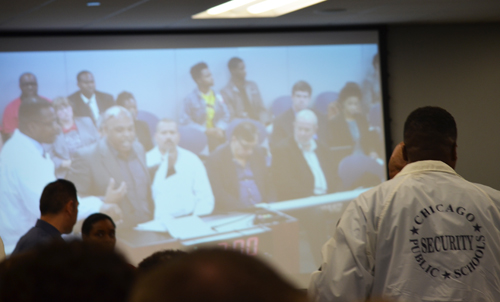 CPS Security continued to bully anyone who spoke beyond the "two minute" call, even though as usual there were fewer than 40 actual speakers during the "public participation" part of the August 26, 2015 meeting of the Chicago Board of Education. Above, security snatched the microphone away from Austin community leader Dwayne Truss, who has more years working for the city's real public schools than all but two of the current members of the Chicago Board of Education. Earlier, for the third month in a row, security had swarmed against Chicago Teachers Union Financial Secretary Kristine Mayle. Substance photo by George N. Schmidt.Dwayne Truss, of the South Austin Community Coalition, said he supports the Dyett hunger strikers. He added that 75% of neighborhood schools lost funds while charters gained funds. He noted that neighborhood schools had been closed while opening charter schools. He called this "educational cannibalism." and added "You want to bleed our children."
CPS Security continued to bully anyone who spoke beyond the "two minute" call, even though as usual there were fewer than 40 actual speakers during the "public participation" part of the August 26, 2015 meeting of the Chicago Board of Education. Above, security snatched the microphone away from Austin community leader Dwayne Truss, who has more years working for the city's real public schools than all but two of the current members of the Chicago Board of Education. Earlier, for the third month in a row, security had swarmed against Chicago Teachers Union Financial Secretary Kristine Mayle. Substance photo by George N. Schmidt.Dwayne Truss, of the South Austin Community Coalition, said he supports the Dyett hunger strikers. He added that 75% of neighborhood schools lost funds while charters gained funds. He noted that neighborhood schools had been closed while opening charter schools. He called this "educational cannibalism." and added "You want to bleed our children."
Tanshelda Amos, on the LSC at "Sherman School of Excellence" praised the AUSL "turnaround" stuff and thanked the Board for its support.
Erana Jackson Taylor, a Dyett supporter and graduate, stated that twelve people were on hunger strike and that today was Day 10 of the hunger strike. She told the Board, "You can make the decision today." She said the high school cannot wait until September 13. She also showed pictures.
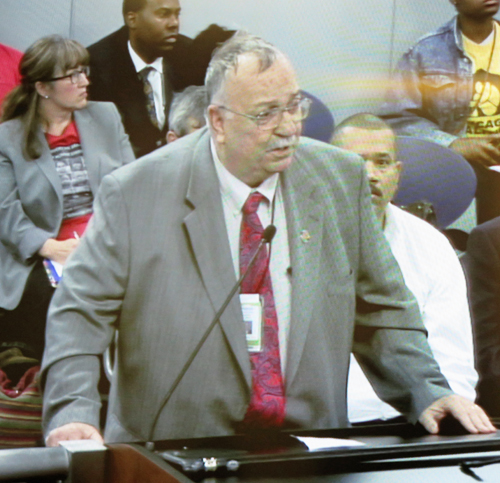 Substance editor George Schmidt told the Board that he could no longer say that this budget was the most cynical or mendacious since he began studying CPS budgets in 1979. Schmidt had signed up to speak indicating that his topic would be "Metaphysics of Mendacity." Substance photo by Sandra Stone.George Schmidt, Substance News Editor, whose topic was the "Metaphysics of Mendacity," said he had been studying the budgets since 1979. He said this budget was one of the most scandalous. He remarked about the lying and lies that go into creating a public scandal like today's. He then went on to comment about the Board's unique way of listing schools in the budget, alphabetically by first name: 15 schools named "Charles Something," 16 schools named "George Something," several schools named John Something and 25 schools named William Something. He called this a cynical attack on the public. He quoted Aristotle, "All men and women desire to know," and said the Board wants to prevent the public from knowing.
Substance editor George Schmidt told the Board that he could no longer say that this budget was the most cynical or mendacious since he began studying CPS budgets in 1979. Schmidt had signed up to speak indicating that his topic would be "Metaphysics of Mendacity." Substance photo by Sandra Stone.George Schmidt, Substance News Editor, whose topic was the "Metaphysics of Mendacity," said he had been studying the budgets since 1979. He said this budget was one of the most scandalous. He remarked about the lying and lies that go into creating a public scandal like today's. He then went on to comment about the Board's unique way of listing schools in the budget, alphabetically by first name: 15 schools named "Charles Something," 16 schools named "George Something," several schools named John Something and 25 schools named William Something. He called this a cynical attack on the public. He quoted Aristotle, "All men and women desire to know," and said the Board wants to prevent the public from knowing.
Steven Guy spoke of security issues at his school, the so-called "Fuller School of Excellence," another AUSL school. He also thanked the Board.
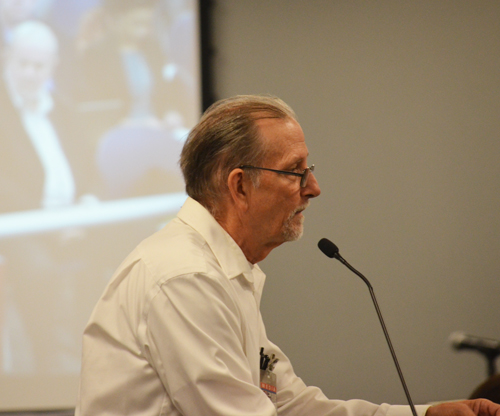 South Chicago community leader (and Substance photographer) David Vance urged the Board to end "co-locations" and demanded that the Board stop expanding charter schools in his community. Substance photo by George N. Schmidt.David Vance, of the 10th Ward, who attends Board meetings as a photographer for Substance News and Labor Beat, addressed his remarks to CEO Forrest Claypool. He asked him to put a freeze on charter schools. He also asked him to shut down the Department of Innovation and Incubation since it no longer had a department head now that Jack Elsey was gone. He asked why there was still a department. He asked that "co-sharing" of neighborhood schools with charter schools be ended. He requested that Baker get out of Bowen and that LEARN charter school be removed from J. N. Thorp School. He wondered, "Why you would put two schools in one building unless you wanted to close one?" He was cut off from saying any more.
South Chicago community leader (and Substance photographer) David Vance urged the Board to end "co-locations" and demanded that the Board stop expanding charter schools in his community. Substance photo by George N. Schmidt.David Vance, of the 10th Ward, who attends Board meetings as a photographer for Substance News and Labor Beat, addressed his remarks to CEO Forrest Claypool. He asked him to put a freeze on charter schools. He also asked him to shut down the Department of Innovation and Incubation since it no longer had a department head now that Jack Elsey was gone. He asked why there was still a department. He asked that "co-sharing" of neighborhood schools with charter schools be ended. He requested that Baker get out of Bowen and that LEARN charter school be removed from J. N. Thorp School. He wondered, "Why you would put two schools in one building unless you wanted to close one?" He was cut off from saying any more.
Jana Randle, on the LSC at Bowen High School, spoke of the $1.3 million dollars in cuts in the budget. She asked, "How can we continue to serve students?" She said that eight new classes were being offered this year while closing nine positions. She also wondered about students who had been pushed out of charter schools into neighborhood schools for behavior problems.
Dr. Margery Ginsberg, of the UIC, spoke about working closely with Bowen High School. She said that Bowen has a grant for teacher and leadership development . She stressed that we must get better at supporting Day in a Day and Snapshot. She added that two hours had been spent visiting every classroom and they had exhibited wonderful portfolios.
Nia Abdullah was allowed to concede her time to Bria Randall who also spoke about
Bowen High School. She said that two positions had been closed and that a dual credit English teacher was the only teacher with the credentials to teach a college specialty. She added that most Bowen students who go on to college are the first in their families to attend college. She asked the Board to addfunding for college studies.
Neal Resnikoff, of the Albany Park Neighbors for Peace and Justice, said that CPS should seek revenue from the two-thirds of corporations not paying taxes on profits and should pay higher taxes. He added that a tax on financial transactions would wipe out the CPS deficit. He asked that the rich pay, remarking that we, the people, do not feel it is just and fair to pay one more penny for property taxes. No Board member responded to his remarks.
Rodney Estvan, of Access Living of Chicago, who spoke about the FY16 budget told the Board that "you have our copy of our annual report indicating a CPS deficit, a disaster." He said, "Legally you have to have a budget." He added that the "roller coaster" of special education funding in the district has to stop. He said that first teachers are cut and then re-funded, resulting in principals trying to hire special ed teachers after the school year has begun. He mentioned that there is a shortage of SPED teachers, the SPED system is dysfunctional, Access Living has worked with the Board to restore 60 positions, and that an audit that was done was not correct.
Carolina Cruz, who lives near Kelly High School, applied to a selective enrollment school but didn't score high enough. She went to Westinghouse High School but she said her parents didn't want this. She then went to Noble Charter School Chicago Bulls High School which required her to travel two hours each day. She said that now she is a junior
and her sister will attend DePaul in the fall. She asked for a new Southwest side Noble School and handed in a stack of signed petitions requesting this. She asked the Board to please approve this proposal.
Bob George supports the people on the Dyett hunger strike and mentioned that two hunger strikers are here today. He remarked that the Dyett supporters had worked for five years to get the Board's attention and that the decision should have been made 4 1/2 years ago, but the proposal was ignored. He mentioned the motto, "Black Lives Matter," and said that if they matter, they must be paid attention to the same as white lives. He then quoted Ella Fitzgerald.
Mary Hughes, Director of the 19th Ward Parents for Special Education, an advocacy group, said that "one size fits all" does not work for SPED. She emphasized that non essential spending has to stop and it has to start with you (the Board).
Jesus Campuzano also supports the Dyett hunger strikers. He said that he was a CPS student who had SPED training in the past. He remarked that it was sad about the cuts. He chastised the Board, saying "You don't actually care." Look at Claypool, first one position with the city and then another and now here, "like a revolving door." He asked CEO Claypool, "Don't you care?" He affirmed, "All lives matter. We need an elected school board and we need it now.
Jack Taylor spoke about the Chicago Desegregation Decree which was ended when only 9% of white people were left in the system and couldn't integrate the system. He said that now the system is back to segregation discrimination along social lines. He asked the Board, "What are you going to do?" He remarked that profits of corporations come above children. He said he wanted an answer now and asked the Board, "Are you going to make a change?"
Joy Clendenning, a Kenwood High School parent and a Hyde Parker, spoke about the Coalition to Revive Dyett High School, which proposes that the community should be involved in the design of any new school. She remarked that there were 12 hunger strikers who want this proposal accepted. She added, " We hope you will do the right thing and allow everyone who has signed up to speak to speak."
Pauline Lipman of the UIC said that many had signed the statement on August 24th approving the proposal for Dyett High School. She added that the proposal should be a model, that today was the tenth day of the strike, and it was a blot on CPS and the City of Chicago that they have to go on a hunger strike to get quality in this neighborhood. She mentioned Jeanette Taylor (a hunger striker who had appeared earlier with Alderman Susan Sadlowski Garza) had been taken out of the chambers by paramedics to an ambulance.
Tyrita Osborne, of the Chicago Coalition for the Homeless, said that homeless students are to be provided transportation money by CPS to travel to their school of origin. She informed the Board that she had to buy bus cards instead. She said that she was saving to get her own apartment and that friends and family gave her money for transportation. She added that legal rights to transportation had to be understood.
Jayme Robinson, also of the Chicago Coalition for the Homeless, spoke about transportation for homeless students. She said that when she was a senior she was kicked out because of family. She spent four hours a day commuting. She didn't transfer to a different school because the home school provides stability. She added that being in a familiar school helps you forget you are homeless. She mentioned that she was able to stay in her home school because of transportation money and was currently a senior at UIC. She concluded that there needs to be a clear policy.
Ronald Jackson spoke to the Board, reminding them that a year ago a student took her life because of bullying. He said that she had been bullied and took her own life. He charged that the Board did not take action. Then he claimed that there was a bullying problem at a "charter school" that he didn't name. Addressing the new Board member Garanzini, a Catholic priest, he said him that "as a man of the cloth, you should be concerned." He added, "If it were your child being bullied...think about this." He also said in regard to special education, "Where is the monitor?"
Angelina Martinez spoke in Spanish which was translated. She wanted to share her story from Muchin College Prep, a Nobel Charter School. She said she supported the expansion of a Nobel Charter School to the Southwest, two blocks from her home, because she wants discipline for her son and wants him to go to college.
Joseph Sunshine, a teacher at Bowen High School and an LSC member, said that the gains at Bowen were recognized nationally and that 97% of students go to college. He informed the Board that next year there will be eight new classes but that Bowen is losing teachers and support staff because of budget losses.
Alfred Rodgers, on the LSC at Gage Park High School, said that he wished CEO Claypool well and asked for a complete audit of Gage Park. He claimed that stealing was going on and mentioned that his son is an accountant.
Erik Young, of King College Prep High School, spoke in contrasting rhymes about teaching and learning conditions. He mentioned cause and effect and cause and neglect, students first and students cursed. He also said that maybe we ought to elect the school board, have no more toxic swaps, and give the Dyett hunger strikers respect.
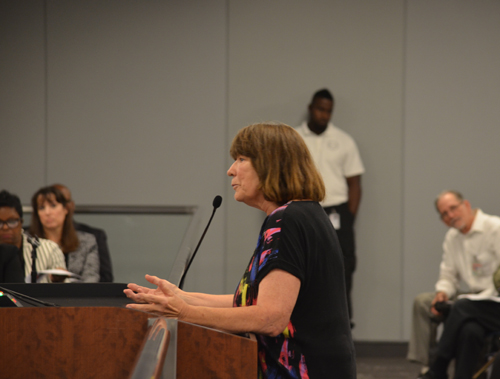 In addition to siccing security on speakers who disagreed with the Board's Party Line, CPS secretary Estela Beltran also tried to ignore several people who were signed up to speak. Among those was Substance reporter Jean Schwab, who had to remind the secretary that she still hadn't been called on when the secretary was ready to claim that the public participation had ended. Others also noted that under Forrest Claypool the Board is even less tolerant of public critics, while fawning as usual over those who stand up to praise the charter schools, even when among them was a woman who basically told the Board that Westinghouse High School was "not acceptable" to her family -- because most of its students are African Americans. Schwab spoke in favor of the Dyett hunger strikers. Substance photo by George N. Schmidt.Last to speak was Jean Schwab who identified herself as a grandmother of six children at Moos School. She remarked that she is satisfied with Moos. Regarding Dyett High School, she told the Board that just as a grandmother, if we lived in that community, my grandson might want to go there and if a community wants something so badly, she asked, "What is the problem?" She spoke of brand new charter schools being put up near her home and asked, "Where do they get the funds, maybe Walmart." She concluded, "I don't understand this process at all."
In addition to siccing security on speakers who disagreed with the Board's Party Line, CPS secretary Estela Beltran also tried to ignore several people who were signed up to speak. Among those was Substance reporter Jean Schwab, who had to remind the secretary that she still hadn't been called on when the secretary was ready to claim that the public participation had ended. Others also noted that under Forrest Claypool the Board is even less tolerant of public critics, while fawning as usual over those who stand up to praise the charter schools, even when among them was a woman who basically told the Board that Westinghouse High School was "not acceptable" to her family -- because most of its students are African Americans. Schwab spoke in favor of the Dyett hunger strikers. Substance photo by George N. Schmidt.Last to speak was Jean Schwab who identified herself as a grandmother of six children at Moos School. She remarked that she is satisfied with Moos. Regarding Dyett High School, she told the Board that just as a grandmother, if we lived in that community, my grandson might want to go there and if a community wants something so badly, she asked, "What is the problem?" She spoke of brand new charter schools being put up near her home and asked, "Where do they get the funds, maybe Walmart." She concluded, "I don't understand this process at all."
Public participation ended at 1:00 p.m. Thirty-three of 60 persons who signed up to speak actually did speak. Each was allotted two minutes. If 60 people had spoken, public participation would have taken 120 minutes instead of 66.
Board member Mahalia Hines asked that in the future Markey Winston make a special education presentation. She asked, "Where will we get the children from for the Global Leadership Academy? There are not that many in the neighborhood." She said that most would go to Kenwood, not Dyett.
She also said that Bowen has SIG grants that have been provided to them and a process is needed to help schools transition out of SIG grants.
Board Vice President Ruiz added remarks to "piggy back" on Board member Hines' remarks. He said there should be a briefing on homeless concerns every month on the budget.
Board President Clark said that Dyett needs to be brought to a resolution and we need to reach a conclusion after talking to other Board members.
Following his statement, Board member Hines read the statement allowing the Board to go into closed session.


By: Jean Schwab
Dyett High
This is such a no brainer. Give the community the school they want and are committed to and the same resources given to Charter School and it will succeed. The community is committed to making this work. I envision Dyett High becoming a model for community schools throughout the nation. People from all over will rush to Chicago to see a community generated neighborhood school. Students will want to sign up for this history making school. What a legacy Rahm and his board will make for themselves!